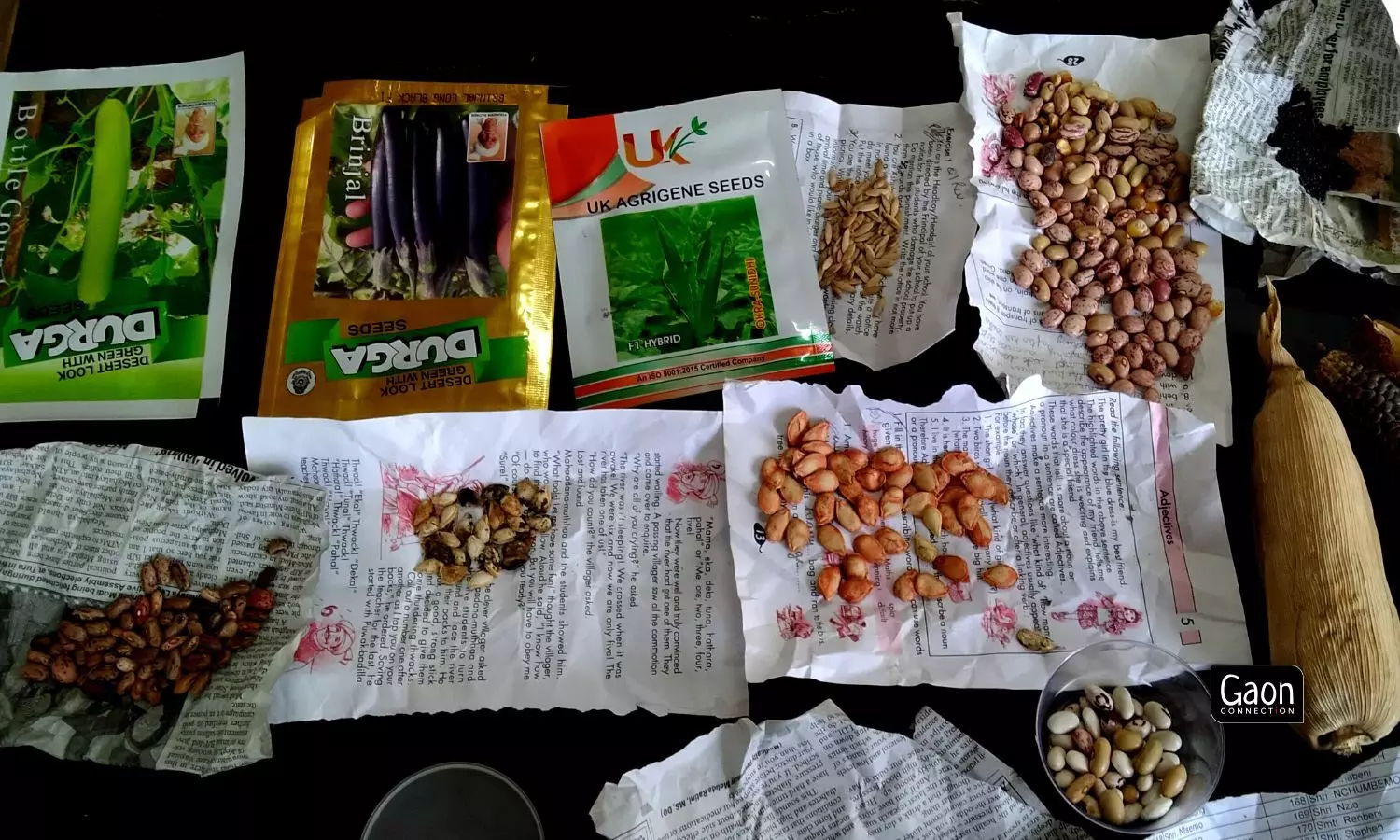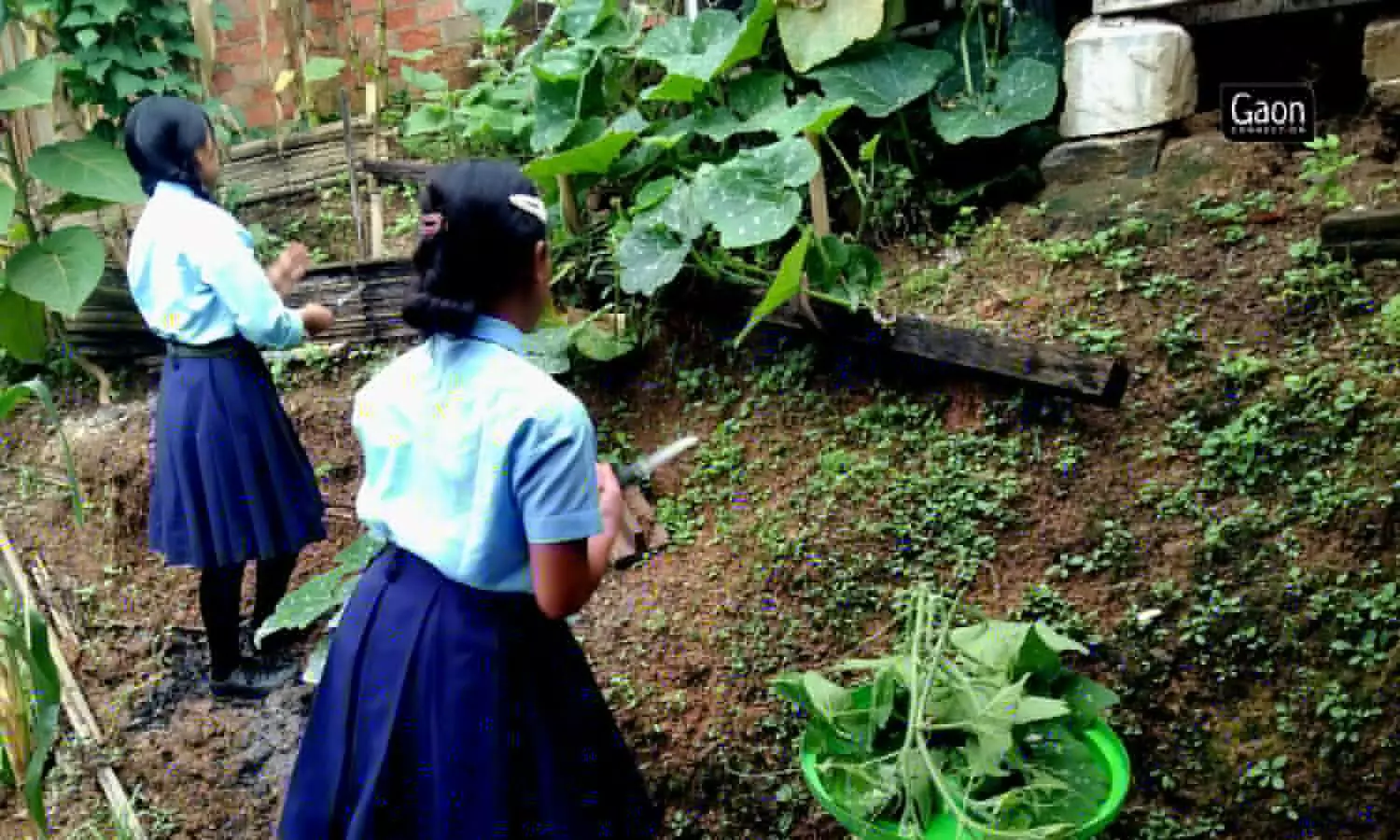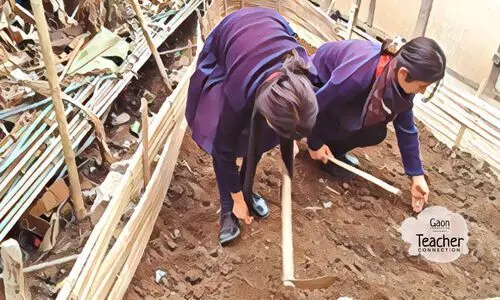In March 2010, when Mimi Yhoshii took charge as the head teacher of Government Middle School Officers Hill district, Kohima in Nagaland, she wanted every student under her care to have a holistic education.
Most of the children who came to school were from families that were unable to provide them with adequate nutrition required for a healthy life.
So, she started a kitchen garden in the school premises. For the past four years, the students have been growing and eating seasonal vegetables as part of their mid-day meals. They grow cabbage, pumpkin, squash, chillies, bottle gourd, tomato, beans, maize and several other vegetables.

Agriculture is the backbone of India’s economy and every child should understand the importance of it, said Mimi Yhoshii.
“A child needs healthy and nutritious food in order to grow up healthy,” the 51- year-old Yhoshii told Gaon Connection. She believes in learning by doing and that was the idea behind having the kitchen garden at school.
“Agriculture is the backbone of India’s economy, every child should understand the importance of farmers and farming. I am trying to instil in them the ability to grow food so that they can earn their living from a young age instead of waiting around for government jobs,” said the head teacher.
Also Read: Learning English on tree tops and baking millet cakes at a village school in Bihar
Good health begins at school
There are three gardens in Government Middle School Officers Hill — a rectangular one that is 24 x 4 feet, a triangular one that is 10 x 12 x 14 feet, and in each of three terraces of the school. Due to space constraints, empty cement bags and sacks are also used for growing the produce.

The kitchen garden is an out-of-the-box initiative, it has brought the teachers and students under a single roof.
“Scientists across the globe are constantly telling us how mass grown vegetables available in the markets have become a storehouse of toxic chemicals. Now, we are able to eat at least some vegetables that are organically grown and chemical-free,” said Yhoshii, who has been honoured with the National Teacher Award-2022.
The gardening project has created strong bonds between the teachers and students. “The kitchen garden is an out-of-the-box initiative, it has brought the teachers and students under a single roof. Every teacher has been assigned a different responsibility and we work closely with the students to monitor the garden,” Imtirenla Jamir, a senior teacher of the school, told Gaon Connection.
According to Jamir, all 18 teachers and around 80 students from classes five to eight are actively involved in the kitchen garden. “The garden has brought recognition to our school, it is our duty to take good care of it,” she added.
Fourteen-year-old Suman Gandrama, a class 8 student finds gardening a perfect stress buster. “We prepare the beds, plant seeds, grow vegetables, and even cook and eat together. It is like being on a picnic,” said Gandrama.
“We have all read about organic produce in books, but thanks to our teachers, we now grow them ourselves,” she added.
Also Read: Agriculture is a sought after vocational course in this village high school in West Bengal
Learning to make pickles
Besides gardening, the students have vocational courses where they learn how to make pickles, make paper bags out of papers collected from people’s homes. They distribute the bags to the shops around their area so that the use of plastic can be lessened.
“I love making pickles and have made garlic, ginger and chilli pickles,” said Vicky Kumar, a class 7 student.
Children eagerly wait for November when their head teacher organises a sale day, “Throughout the year, our children make so many things and on sale day, a few days before Christmas, we display and sell their products. The income generated from the sale day is mostly used to purchase items for school activities,” Yhoshii explained.
Students are urged to follow the ‘3 Rs’ of waste management— Reduce, Reuse, and Recycle.

The school is earning praises from all quarters. “I have been to GMS Officers’ Hill; the space is very small. But with the available space, Mimi Yhoshii has turned it into an organic kitchen garden for her students’ mid-day meal,” said Avino Tase, Deputy Director at the Directorate of School Education (Nodal officer/SPOC for National Awards to Teachers – NAT).
“She has taken a commendable initiative, helping students develop skills in gardening, organic farming, and the dignity of labour, in addition to their regular lessons,” Tase added.
Growing vegetables instils confidence and pride in the learners. With rising commodity prices, Mimi Yhoshii has cut down her expenses to provide healthy, nutritious, and a luxurious midday meal to her students. She sets a great example, said Tase.
Also Read: A rural teacher roots for Assamese culture while imparting modern education
“Farming should be in the school curriculum,” said Imsutola Jamir, Dietitian at Christian Institute Of Health Sciences & Research (CIHSR), Chumukedima.
“Eating not only involves all the sensory organs but also our psychology. When the children harvest and grow their vegetables, it also develops an interest in them to respect the food they grow,” she added.
She agreed with Yhoshii about how children eating right was so important in their growing years. “When children eat locally grown food they get the maximum nutrients like carotenoids, folic acid, vitamin C, riboflavin, iron, calcium fiber, etc from the fresh produce. These nutrients are essential for overall development,” said Jamir.




















